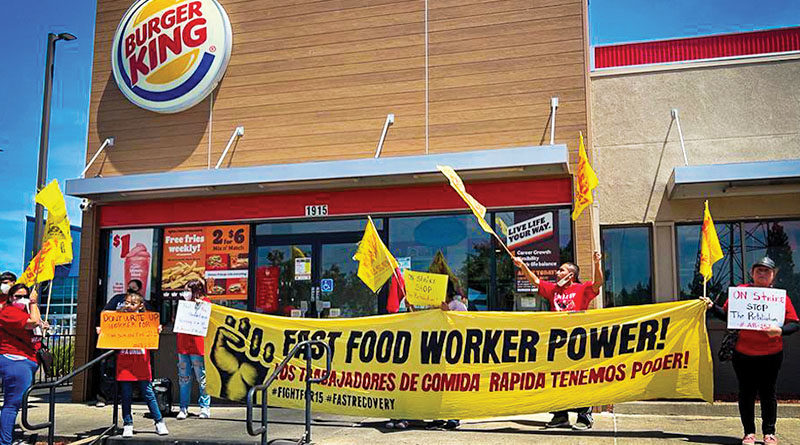Fast food workers strike for more protections
By Sheri Williams
In May, workers at a Burger King in Sacramento walked off the job in protest of a broken air conditioner that they said left them toiling in temperatures that topped 100 degrees.
The strike is part of a coordinated effort across the state to highlight and protest poor working conditions in fast food restaurants as SEIU and the Fight for $15 campaign work for the passage of Assembly Bill 257, which would give these essential workers more rights.
Burger King worker Kaley Moore is the Sacramento Burger King employee leading the fight for better working conditions at her Arden store where the air conditioner is broken.
“It’s so hot up in there,” she said in a video posted on social media. “I feel … sick.”
Moore said that workers have reported feeling dizzy and nauseous because of the heat, prompting her to help organize the lunch time walkout.
Fast food strikes like the one at Moore’s store are becoming more common across California as workers fight for AB 257. Strikes have taken place recently in San Jose and Los Angeles, among other places.
AB 257, the FAST Recovery Act, is groundbreaking legislation that addresses the imbalance of power in the fast food industry and its rampant labor violations, according to the union. AB 257 would guarantee fast food workers and fast food franchisees a seat at the table to help shape sector-wide workplace standards and give them the ability to hold corporate franchisors accountable for providing safe and equitable working conditions.
Wendy Carillo, a former SEIU employee and current Assembly member, authored the bill.
She told media the bill “establishes, for the first time, a Fast Food Sector Council and tasks the council with conducting a full review every three years on the adequacy of fast food, restaurant health safety, employment standards, and establishing a statewide minimum health safety wage and working hours and employment standards.”
In a recent survey of fast food workers, researchers found rampant wage theft and other abuses that AB 257 would help to fix.
Eighty-five percent of workers who took part in the survey said they have experienced at least one form of wage theft. Fifty-seven percent of workers have experienced multiple forms of wage theft.
Nearly one-third of workers have been retaliated against for asking to be paid properly, taking a sick day, or asking to be paid for a sick day, the survey found.
California’s fast-food industry is one of the largest, fastest growing private sector employers in the state, according to the report.
“The global fast-food corporations that operate in California make billions of dollars in profits, yet fast-food workers rank among California’s lowest paid large occupational groups,” the authors wrote. “Over the course of the pandemic, fast-food workers emerged as an essential workforce, helping to feed communities and fuel local economies across the state. As our new survey finds, however, these same workers—employed by some of the world’s largest, most profitable brands—face rampant wage theft by their employers.”
The 2022 California Fast-Food Wage Theft Worker Survey interviewed 410 fast food workers from 259 fast-food locations in 86 cities in California. The workers surveyed represent 44 different brands, including McDonald’s, Jack in the Box, Carl’s Jr., Burger King, Subway, KFC and Taco Bell, as well as many smaller outlets.
In a separate study, labor researchers also found that fast food workers have faced increasing violence over the course of the pandemic.
“The accounts that fast-food workers share about the violence they face going to work every day are deeply distressing,” the researchers wrote.
In interviews with The Fight for $15 and a Union, as well as complaints made to CalOSHA and public health departments across the state, these workers relate being physically assaulted, held up at gunpoint, cursed at, spit on and subject to racist tirades on a regular basis. They describe an environment under constant threat, with customers jumping the front counter of restaurants, climbing in through the drive-through, barging into the kitchen through the back door, throwing rocks through windows, and kicking and banging on locked doors. Some of this violence involves criminal activity such as a robbery attempt or a drug deal. Much of it is irrational and random, however, an enraged response from a belligerent customer directed at a worker who is simply doing his or her job, the report said.
In a statement emailed to The Sacramento Bee, Burger King said that it was aware of the situation at the Sacramento franchise but denied the air conditioner had been broken for a long time.
“We will continue to stay in contact with the franchisee to ensure the high standards we collectively share are maintained for both Team Members and valued Guests,” the company told The Bee.
